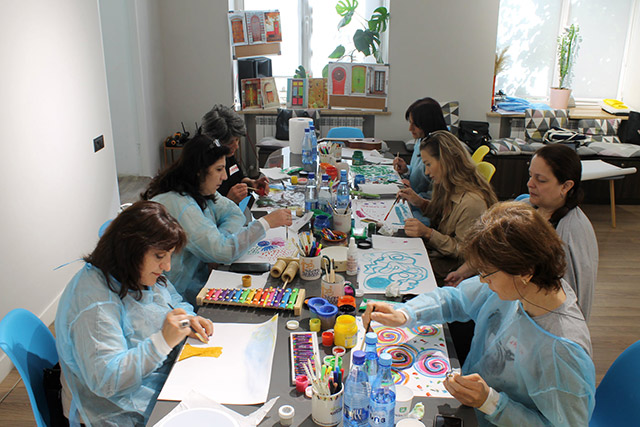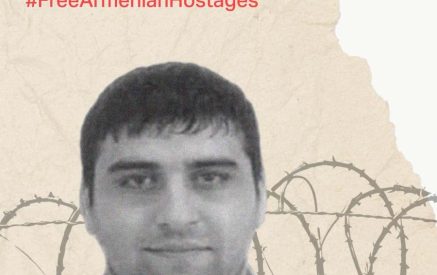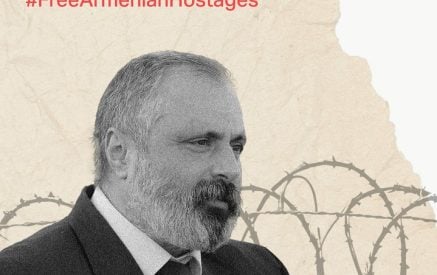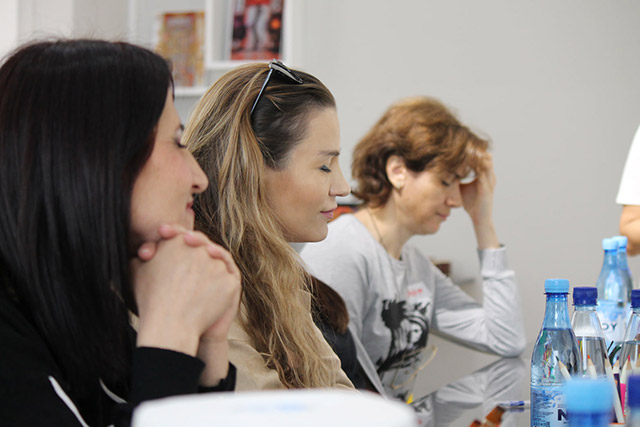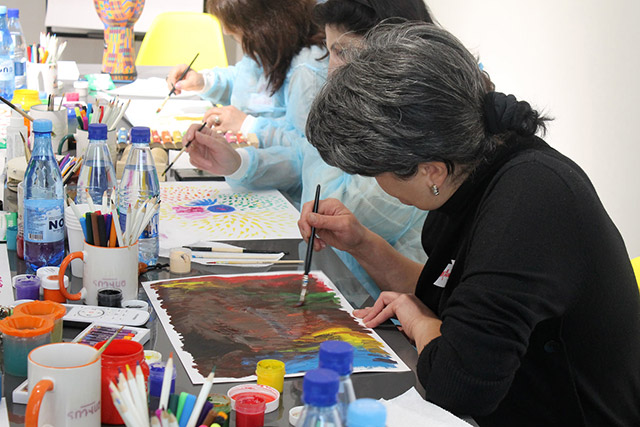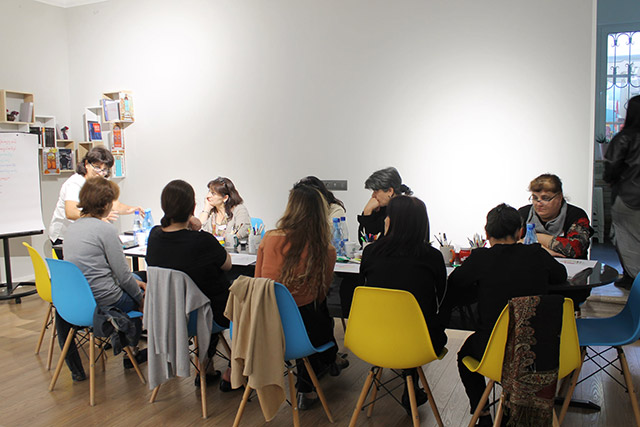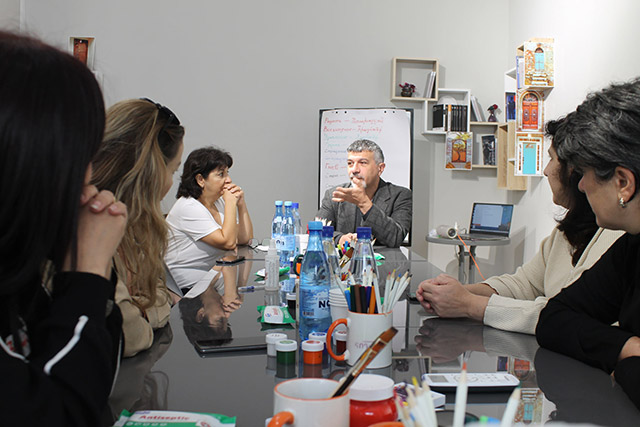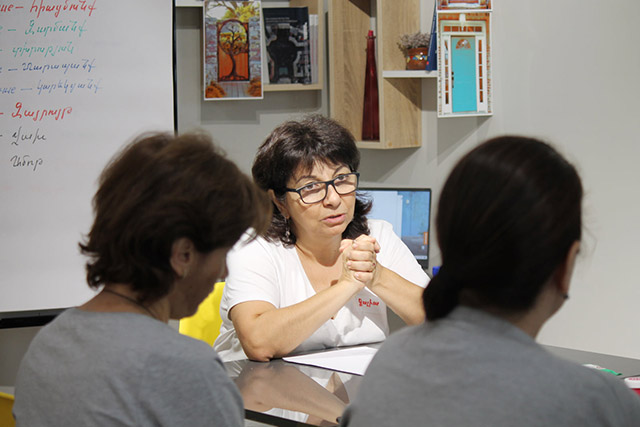“Within a few seconds, the light disappeared, I heard a crash, I thought I was dead, because I didn’t feel anything for a few seconds. There was so much smoke and dust, and only my 3-year-old grandson’s cry brought me to my senses, I saw people confused, crying, screaming. I hugged my grandson in the dark and didn’t know where to run to save myself. Everyone was pushing each other to the exit, including me. My daughter-in-law was waiting for me on the steps, she hugged the baby, and we went out together. We didn’t know where to run. It was raining heavily and there was a flood. Everything was jumbled around. The roof of the house of culture was thrown over to the electric wires. People were shouting, 50 or maybe more of them wounded with bloody hands and heads were screaming in pain,”- this is how the residents of Artsakh, who went through the most difficult days of the war, and then were forced to leave their homes, tell about this tragedy.
Providing an opportunity to speak, to listen, to relive and overcome the pain, was the goal of the project implemented by the Civil Society Institute NGO, within the framework of which about 50 IDPs from Artsakh told their stories.
The director of the NGO Artak Kirakosyan says that the project is a result of long-term cooperation with the “inmedio” mediation organization in Berlin, and was funded by the German Ministry of Foreign Affairs.
“Years ago, when the cooperation started, the project was engaged in raising awareness on overcoming conflicts, and then the network members were implementing some small projects, applying the knowledge gained during the trainings. However, after the war, the project had to be redirected. We realized that it is important to work with the trauma,” says Kirakosyan, adding that for about a year the network members organized trainings and meetings related to overcoming trauma in Stepanakert, Martuni (Nagorno-Karabakh), Chambarak, Metsamor and other cities.
Read also
The head of the Harmony Shushi women NGO, psychologist Julietta Arustamyan, within the framework of this project, decided to talk with women who went through the war, were forced to leave their homes and still live in an unknown future, without any status.
Julietta herself is from Shushi. She moved there during the first Karabakh war, when she and her family were forcibly deported from Azerbaijan and her husband died in the war. Thus, this is the second time Julietta is experiencing the difficult journey of an IDP.
“I realized the importance of this work, because I went through this myself. I was told many times what a strong woman I am, but after going through all this a second time, it became clear that being strong is just a layout, and everything is crushed inside. And it is crushed, mostly, because we endlessly push these problems inward, while we have to talk, cry, relive them in order to overcome them and to move forward. Thinking about this I felt that it is important to help people in that process. Of course, it was very difficult for me as well, hearing all those stories, and I was emphasizing with people, crying together with them. Although it is told that psychologists should not show their feelings, this situation was different,” Julietta says and continues to read some of the stories.
“On the second day of the war, the son of our neighbor, Arthur, who grew up without a father, died. His body was brought two days later. In the afternoon, I went to their house to express my condolences when the drones started bombing. Several shells fell near us, we had to leave the deceased, seek refuge in some crevices. Survival was more important than our moral support.”
“They said we have to go down to the basements, but the basements were in a terrible state – damp, wet, unprepared. It’s our fault that we haven’t cleaned them before. But that didn’t matter anymore. We were told to stay in the basements.”
“When I was still in the village, there was a woman, her son died, but she didn’t know. The whole village knew, but she didn’t. It was so hard standing next to this womam, knowing that her child is gone and not telling her. She was worrying about him, and no one could tell her what happened. She wasn’t aware, not losing hope and waiting for a call.”
“How did that happen that Aknaghbyur is no longer ours? It’s not me who should answer that question, but our feeble and incompetent administration. Many boys tell and the villagers will confirm how they were easily and calmly evicted from the village, persuaded that the special forces of Artsakh will come and give an adequate answer and that they cannot give an adequate answer, that there will be human losses. But the situation was exactly the opposite, from the forest near the village our boys saw that there were no special forces, and the enemy of some 30 people entered Aknaghbyur without any resistance, without a single shot, and burned everything that people had been creating for years and centuries.”
“As soon as the ceasefire was announced, my husband came to us and left again. We kept pigs, chickens and geese in our village, he went to look after our house. He went to the village, the head of the village said that they were giving wheat to cultivate the fields, they went for the wheat… were seized, taken to Baku and held for about 5 days. My husband and our village friend were exchanged by Russian peacekeepers, General Muradov. They were kept in very bad, cruel conditions. My husband says we take better care of our dog, we give it hot food, and they were kept there in terrible, ugly conditions.”
Arustamyan says that the project was implemented from November 1, 2020 to January 15, 2021. She visited people of Artsakh located in 7 cities and 4 villages, talked to women forcibly displaced from 13 settlements of 5 regions of Artsakh, aged 20-82.
According to Arustamyan, she wants to make these interviews public so that people sober up and understand what happened:
“It often seems that in places where the sounds of shells were not heard, people do not understand what actually happened and what may happen. Maybe these publications will make people more alert.”
Arustamyan considers the program successful, as after the interviews, many people approached her saying it became easier for them, many people keep in touch over time and call if necessary ․
“Having witnessed the horrors of the war, we try not to return to these memories, so that we do not feel fear, pain, helplessness again and again, but in this very way we become more and more immersed in these problems. Only by telling our story, telling what we feel, what we fear, what we want, understanding why it is so important to us, we can get rid of these negative feelings. It is very important that not only women talk about all this, but everyone. Our society needs to overcome this trauma. This feeling of fear must be overcome. Unfortunately, having open traumas from the first war, we found ourselves in the second one.”
Artak Kirakosyan adds that the record of the stories was important also because they became valuable documentary materials.
At the next stage of the project, it is planned to conduct music therapy. Arustamyan is confident that this method will help to overcome the negative consequences of what happened. Meanwhile, she reads out another excerpt from the interviews.
“If we had 5 days before the surrender of Shushi, as in the case of Karvachar and Berdzor, I would probably go to my favorite places in Shushi during these 5 days. I would stay in my room. I would gather my things that mattered to me the most, take them to one of my favorite places and burn them. Ashes would scatter across the gorge. By doing so, I would say goodbye to these years of my life. The house, furniture, etc. would not have burned down, of course. Let them come and use it.”
Gohar Abrahamyan




















































